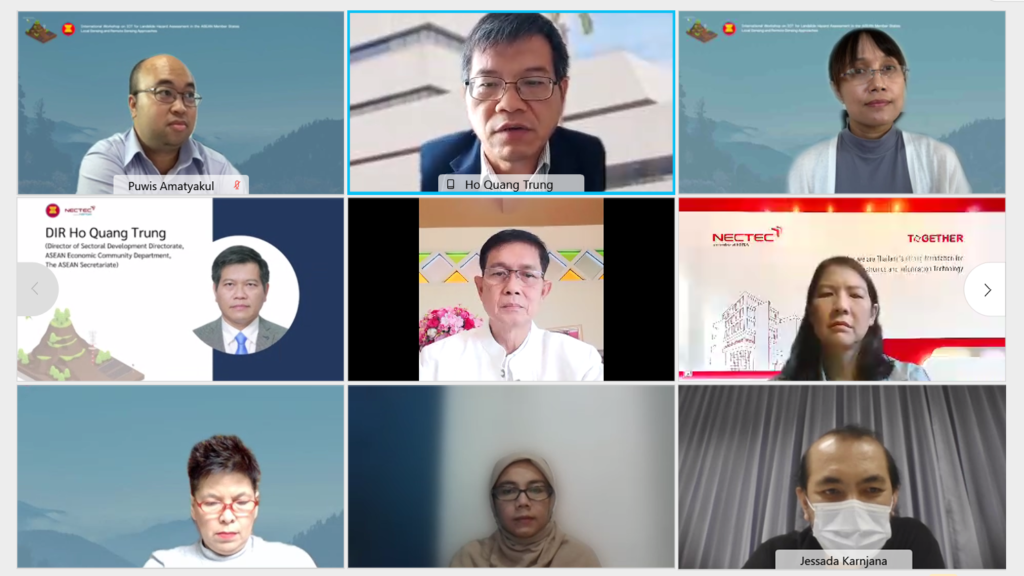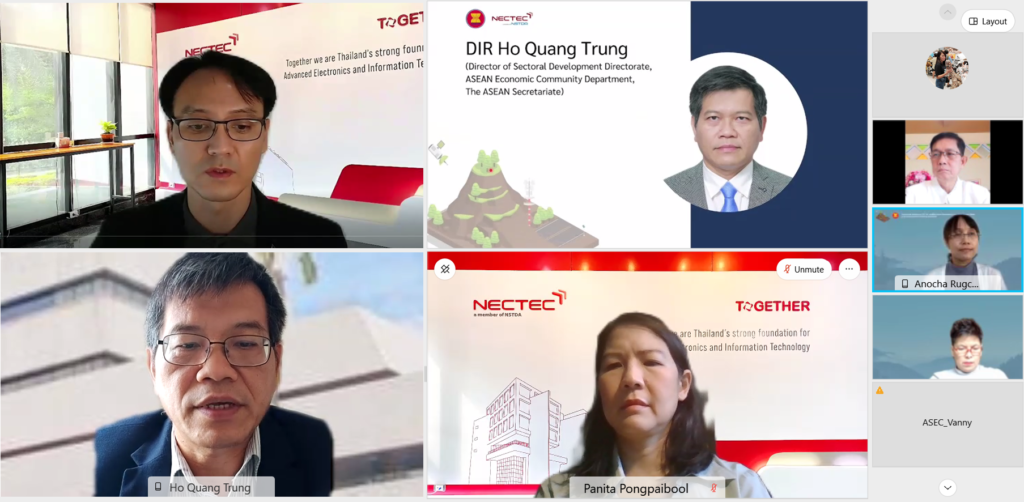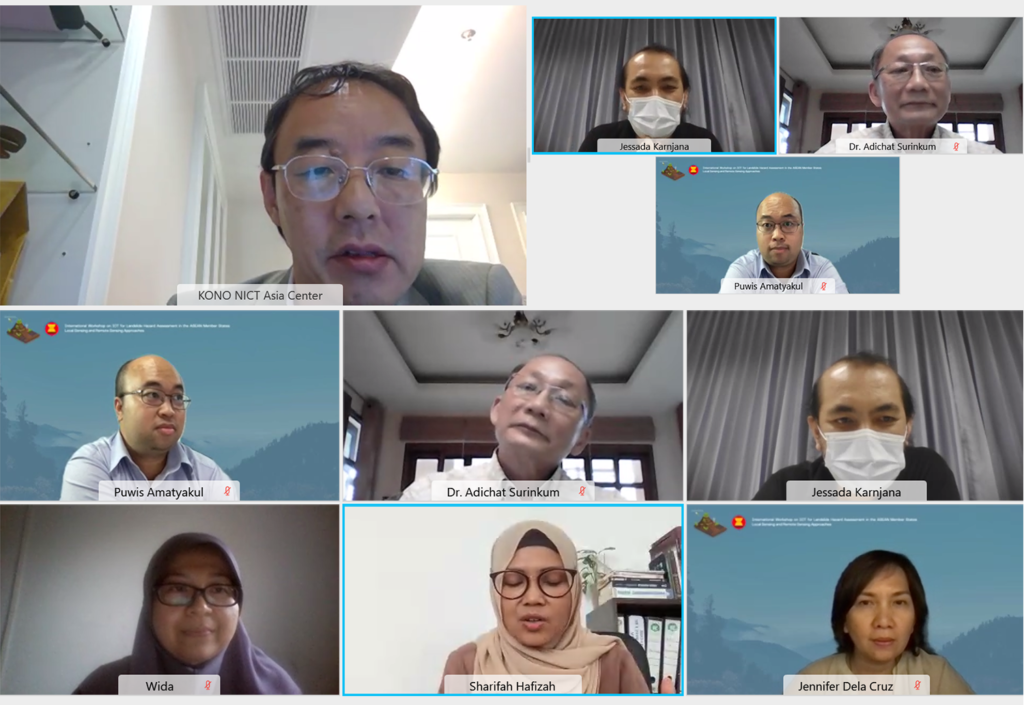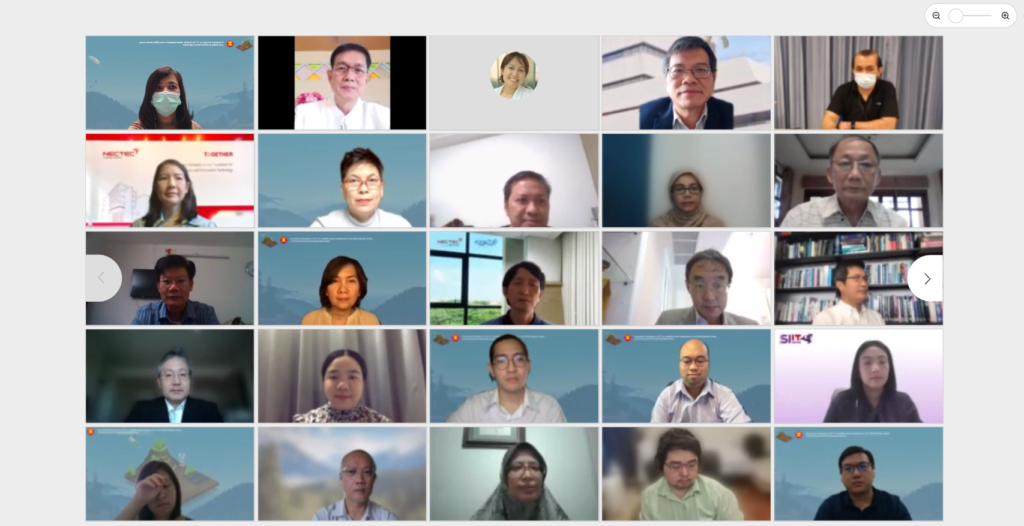
2021 Virtual International Workshop on ICT for Landslide Hazard Assessment in the ASEAN Member successfully hosted by NECTEC
19 August 2021, NECTEC organized the virtual International Workshop on ICT for Landslide Hazard Assessment in the ASEAN Member States (AMS), with the sub-theme of Local sensing and remote sensing approaches. The workshop aims to strengthen strategic research collaboration among academia, research institutions, and networks of excellence centers in ASEAN. This activity is a part of a project, namely ‘Real-time Monitoring Based on Wireless Sensor Networks for Landslide-prone Areas.’ It was endorsed by Sub-Committee on Microelectronics and Information Technology (SCMIT) and ASEAN Committee on Science, Technology, and Innovation (COSTI). More than 70 participants from AMS and Japan participated.
Three main sessions in this workshop were Invited Talk, Technical Session, and Discussion and Reflection. Researchers of the project summarized their research works in the technical sessions. Many experts also shared perspectives on using ICT for landslide disaster management in the invited talk sessions. The workshop’s highlight was the Discussion and Reflection Session. There were discussions from multidisciplinary viewpoints, such as Geology, ICT, and Electronics and Computer Technology, including implementing landslide detection in the actual situation.

Invited Talk Topics
- Novel Techniques to Monitor Landslides Using IoT Sensors
- A Realtime Risk Assessment of Slope Failure Considering the Groundwater Level Fluctuation in Each Slope
- Raising Awareness of Disaster Situations Through Image Generation
- Landslide Hazards and Critical Infrastructure Resilience in ASEAN
- Monitoring and Prediction Landslide for Providing the Disaster Management
- DST-based data fusion with application to landslide risk management
- Temporal Characteristics and Controls on Landsliding in a Coastal Area
- A Location Analysis of Sensors Measuring Pore-water Pressure (Piezometer) for Landslide Early Warning at the Realtime Monitoring Station in Tinh Tuc – Nguyen Binh – Cao Bang
- Establishment and Operation of Deep-seated Landslide Warning System in the Philippines

Technical Session
- Image Enhancement Technique Based on Human Visual Perception and Multi-exposure Fusion for a Landslide-prone Area Monitoring System
- Ground Moisture Observation Stations Integrated with Orientation Monitoring for Land-slide Prediction
- Distance Estimation Between Wireless Sensor Nodes Using RSSI and CSI with Bounded-error State Estimation and Theory of Evidence for a Landslide Monitoring System
- Non-parametric DBSCAN Algorithm Based on Divide-and-conquer Approach for Rockfall Detection
- Clutter Removal Algorithms Based on Grid Density for Rockfall Detection from LiDAR 3D Point Clouds
- Landslide Detection from Satellite Imagery Using Change Detection and Machine Learning
- Landslide Semantic Segmentation Using Deep Learning
“In the long history of humankind (and animal kind, too) those who learned to collaborate and improvise most effectively have prevailed.”
Quoted from Charles Darwin
At the initial stage of the project, Lao PDR and the Philippines participated and followed by other AMS: Brunei, Malaysia, and Vietnam. Time flies, partner expanded from among ASEAN to Japan. In addition to many experts and professors from Thai universities (e.g., CMU, SIIT, TU, MU, and AIT) and NICT and JAIST, Japan, experts from the Department of Mineral Resources (DMR), the Ministry of Natural Resources and Environment, and the Department of Disaster Prevention and Mitigation (DDPM), the Ministry of Interior contributed to this workshop.
From Charles Darwin’s quote above, it is evidence that collaboration is an essential part of our success.

Please find documents of the workshop in the link below.
Shared Materials: Click Here
Abstract Book : Click Here
Workshop VDO : Click here
All Slides : Click Here